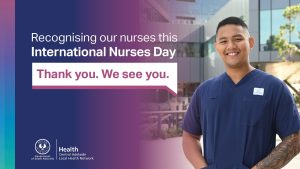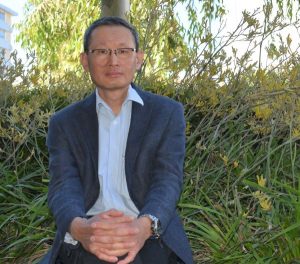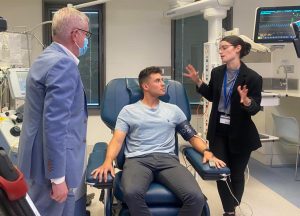The first days after going home from hospital can feel scary.
Proactive healthcare to support people after they are released from hospital is the focus of a new nurse-led program being trialled at The Queen Elizabeth Hospital (TQEH).
Known as TToMMI (Telehealth Transition of people with MultiMorbidity), the trial focuses on older patients with multiple health conditions including diabetes, stroke, heart disease, chronic obstructive pulmonary disease and/or cancer.
Professor Sepehr Shakib is lead researcher on the trial for Central Adelaide Local Health Network (CALHN), with funding provided by CALHN’s Clinical Rapid Implementation Project Scheme.
“This study aims to develop and test a new model for nurses to coordinate care for people with complex and chronic health issues after leaving the hospital,” Professor Shakib says.
“The focus is on using telehealth to offer optimal support, ensuring a smooth transition from hospital to primary care.”
Primary care is delivered by general practitioners, pharmacies and allied health professionals.
“Our goals are to reduce hospital readmission, improve patient’s symptoms and quality of life, and provide continuity of care after discharge,” Professor Shakib says.
Nurses are the first point of contact
At the core of the TToMMI approach are Nurse Transition Coordinators Nicole and Stan, also referred to as STARnurses (STAR is short for Supporting Transitions and Referrals).
“We are the first point of contact for people discharged home,” Nicole says.
“We work in collaboration with families, GPs and appropriate multi-disciplinary healthcare teams.”
Stan says an important aspect of the STARnurse role is to minimise patients becoming anxious in the early days after discharge from hospital, with a particular focus on the first two weeks at home.
“Through staying connected with us, we support people in settling back home and enjoying life again, and linking back into their communities,” says Stan.
“Patients have really been positive about this trial,” adds Nicole.
“As a nurse, I’m really enjoying working with people over a longer period of time, and following how they’re tracking along once they’re out of hospital and in their community.”
The right study design
The study is designed to allow researchers to measure the impact of the TToMMI approach as compared to standard healthcare. It is a pragmatic randomised trial, initiated at TQEH in General Medicine with plans to roll out more broadly across CALHN wards in the future.
“We started this trial in January 2024, and have worked with 44 patients discharged from TQEH so far,” Nicole explains.
“We’re aiming to work with 200 patients in total to ensure the results of our trial are viable from a data perspective.”
Participants in the intervention group are assigned a STARnurse, and have a baseline assessment to determine their risk of readmission and needs upon transition. For 4-8 weeks after hospital discharge (depending on individual needs) the nurse provides telehealth consultations to monitor symptoms, review care needs, enhance self-management, and coordinate health and community-based services, before handover to primary care.
Patients in the control group receive care consistent with established standards and policies after discharge.
The primary analysis will compare the readmission rate at 28 days between the control and intervention groups. Secondary analyses will compare patient-reported continuity of care and changes in symptoms and quality of life from baseline.
The study is modelled on a published evidence base and a successful pilot study at CALHN.
Importance of collaboration
Dr Kate Davis, a co-investigator and nursing research lead at the University of South Australia (UniSA), has been excited to see the progress and impact the STAR nurses have had with multidisciplinary teams, and patients at TQEH.
“The trial intervention involves a transitional care service, based on the Transitional Care Model (TCM©) developed by Professor Mary Naylor and colleagues,” Kate says.
“Both Stan and Nicole met with Professor Naylor when she was a Visiting Research Fellow hosted at the Rosemary Bryant Research Centre at UniSA earlier in 2024”.
Other involved researchers are Professor Marion Eckert, Assoc. Professor Amanda Clark, Mr Ben Cahill, Mr Greg Sharplin and Dr Imogen Ramsey.



